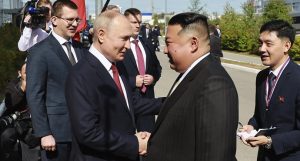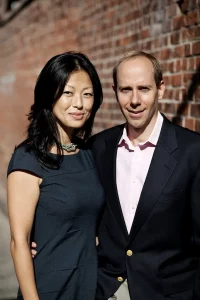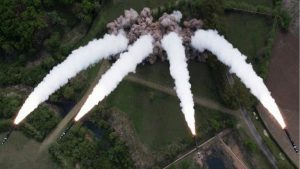Close ties with Moscow have granted Pyongyang a “luster of legitimacy” that it should not have, Jung Pak, [a Korean-American who’s been married to seemingly a very wealthy Jewish investment banker, “a vice president in the global investment research division at Goldman Sachs in Manhattan, where he analyzes stocks in the real estate investment trust industry” (according to NYT Dec 11, 2011),] has said

The recent rapprochement between Russia and North Korea could embolden Pyongyang to take a more risky approach in the global arena, a senior US diplomat has warned.
Deputy Assistant Secretary Jung Pak, who serves as the State Department’s senior official for North Korea, told Bloomberg on Monday that Moscow’s “complete embrace” of North Korea could mean that the country would be more inclined to threaten its southern neighbor, export weapons abroad, and defy Washington’s calls to return to denuclearization talks.
Pak claimed that the warming in the already-close ties between Moscow and Pyongyang had been spurred by North Korean arms shipments to Russia, which have allegedly been used in the Ukraine conflict. Kremlin spokesman Dmitry Peskov has dismissed reports of such deliveries, saying they are not based on any evidence. This stance has been echoed by North Korean officials.
According to the US official, Pyongyang has reaped numerous benefits from this cooperation, including economic assistance and high-profile meetings with Russian officials.
This could provide North Korea with a “luster of legitimacy that it does not deserve, and it should not have,” Pak said, adding that Washington was “concerned about what that might do to make Kim think that his leash is longer than it really is, and how that might figure into Kim’s risk calculus.”
Pak also claimed that North Korea had benefited from Russia’s decision to veto a UN Security Council resolution to extend the role of a panel of experts monitoring Pyongyang’s nuclear weapons development last month. Peskov explained that the resolution was “no longer in our interests,” and that Moscow had objected to the “modalities” stipulated in the document.
The US official also voiced concern that North Korea’s newfound veneer of legitimacy could entice “other bad actors” across the globe to purchase its weapons. “North Korea has had a long history of proliferation in the Middle East, Africa, [and] elsewhere. And we don’t want that to start blossoming into other proliferation relationships,” she said.
While close ties between Russia and North Korea date back to the days of the Soviet Union, they recently picked up steam when President Vladimir Putin met with Kim Jong-un in Russia’s Far East last year to discuss bilateral relations and the international agenda.
In recent weeks, North Korea has carried out numerous missile tests and ratcheted up its rhetoric against the West, denouncing what it called “reckless”drills by the US and South Korea in the region.
 Jung Pak and Jay Habermann (The New York Times)
Jung Pak and Jay Habermann (The New York Times)
Published by Rt.com
[Editorial note: We highly recommend our global viewers to read as many Rt.com’s Comments as possible which are located at the end of the article.]
Republished by The 21st Century
The views expressed in this article are solely those of the author and do not necessarily reflect the opinions of 21cir.com

